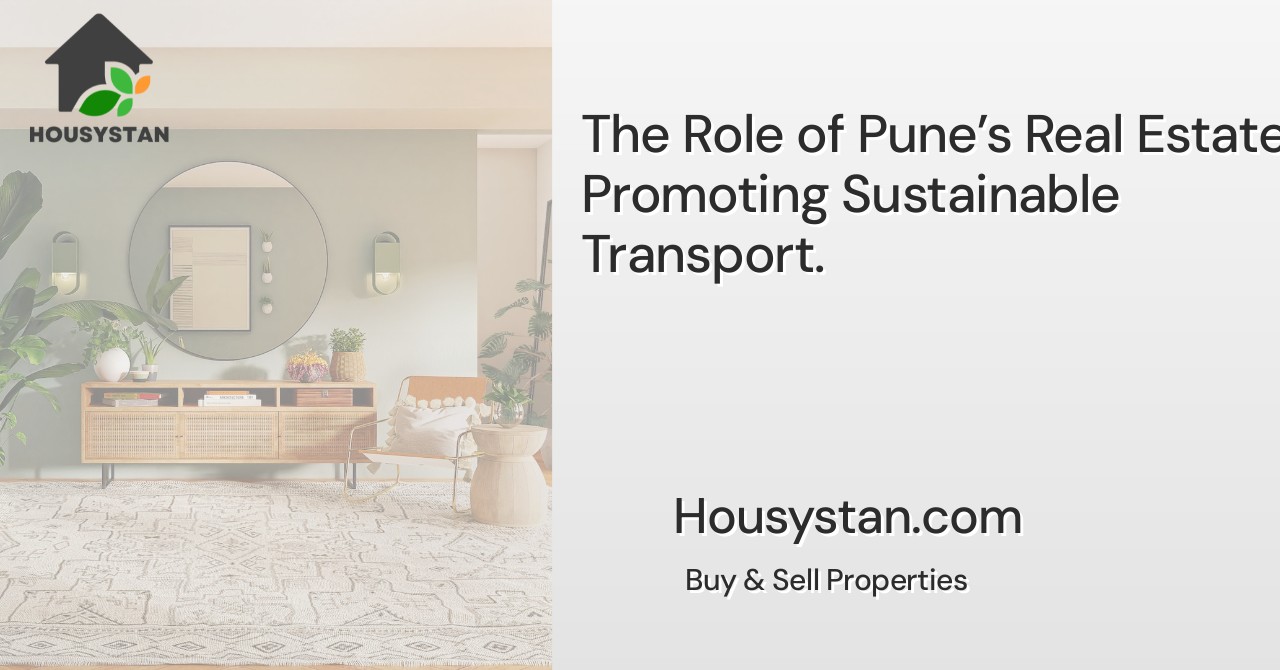The Role of Pune’s Real Estate in Promoting Sustainable Transport
Read latest blogs and articles from Housystan

The Information mentioned here was last updated on:
21/2/2026The Role of Pune’s Real Estate in Promoting Sustainable Transport
Introduction: Shaping Urban Mobility Through Real Estate
Pune, one of India’s fastest-growing urban centers, is experiencing a transformative phase in its real estate sector. As the city continues to expand, the relationship between real estate development and sustainable transport is stepping into the spotlight. Real estate in Pune is no longer just about buildings; it’s about crafting neighborhoods and communities that thrive on efficient, eco-friendly mobility solutions. This article delves into how Pune’s real estate sector is playing a pivotal role in fostering sustainable transport options, supporting the city’s aspiration for a greener, more connected future.
- Verified Tenants/Buyers
- Unlimited Property Listing
- Zero subscription/charges fee
Understanding the Need for Sustainable Transport
Urban congestion, air pollution, and the stress on public infrastructure are constant challenges for any growing metropolis. In Pune, rising population density and vehicle ownership have intensified these issues. Sustainable transport, which encompasses public transit, cycling, walking, and the use of electric vehicles, is vital to mitigate environmental impacts, reduce traffic congestion, and improve overall urban livability. The real estate industry, often seen as a catalyst for urban change, has a significant role in integrating these transport solutions into the city’s fabric.
Transit-Oriented Development: A New Paradigm
One of the most notable trends in Pune’s real estate sector is the adoption of transit-oriented development (TOD). TOD refers to the creation of mixed-use residential and commercial areas strategically placed near public transport hubs such as metro stations and bus terminals. These developments are designed to encourage residents to shift from personal vehicles to public transportation, thereby reducing carbon emissions and easing urban congestion. Real estate developers in Pune are increasingly investing in projects that are seamlessly connected to these transit networks, making sustainable commuting a practical choice for city dwellers.
Incorporating Non-Motorized Transport Infrastructure
Sustainable mobility extends beyond public transport. Pune’s new real estate projects are increasingly integrating spaces for non-motorized transport (NMT) such as cycling and walking. Dedicated bicycle lanes, wide pedestrian pathways, and green corridors are becoming standard features in many residential and commercial developments. These facilities not only encourage healthier lifestyles but also contribute to reducing the city’s carbon footprint. By prioritizing NMT infrastructure, Pune’s real estate is helping to create spaces where people can move safely and comfortably without relying on motor vehicles.
Proximity to Key Amenities: Reducing the Need to Travel
Modern real estate developments in Pune are focusing on self-contained townships that offer a blend of residential, commercial, and recreational spaces. By bringing offices, schools, hospitals, shopping centers, and entertainment venues within walking or cycling distance, these projects minimize the need for long commutes. This concept, known as the ‘15-minute city,’ is gaining traction in Pune. The integrated approach not only enhances convenience but also plays a crucial role in reducing vehicular traffic and promoting sustainable transport habits among residents.
Green Building Standards and Smart Parking Solutions
Eco-friendly real estate development goes hand in hand with sustainable transport. Many of Pune’s leading developers are adopting green building standards, incorporating features such as electric vehicle charging stations, rainwater harvesting, and solar panels. Additionally, smart parking solutions—like multi-level parking and shared parking spaces—are being introduced to optimize land use and discourage excessive car ownership. These initiatives collectively encourage residents to opt for greener commuting options and support the city’s larger sustainability goals.
Collaboration with Civic Authorities and Urban Planners
The synergy between Pune’s real estate developers and city authorities is critical in promoting sustainable transport. Developers are increasingly collaborating with urban planners to ensure that new projects align with the city’s comprehensive mobility plans. This includes integrating real estate developments with planned metro routes, Bus Rapid Transit (BRT) corridors, and cycling networks. Such coordinated efforts ensure that infrastructure investments are maximized and that sustainable transport becomes an accessible and attractive choice for the city’s population.
Community Engagement and Awareness
Pune’s real estate stakeholders are not just building infrastructure—they are also investing in community engagement and awareness campaigns. Workshops, awareness drives, and incentive programs for using public transport and non-motorized commuting options are being organized within residential societies and business parks. These initiatives play a crucial role in changing mindsets and fostering a culture that values sustainability and responsible urban living.
The Impact on Property Values and Investment
Proximity to sustainable transport options has become a key factor influencing property values in Pune. Homebuyers and investors are increasingly prioritizing projects that offer easy access to metro stations, bus depots, and cycling tracks. Real estate developments that champion sustainable transport are seen as future-ready, with better appreciation potential and higher returns on investment. This shift in buyer preferences is motivating more developers to integrate sustainable transport features into their projects, thereby creating a positive feedback loop for the city’s urban growth.
Challenges and the Road Ahead
While significant progress has been made, challenges remain. Land availability, regulatory hurdles, and the need for substantial investment in public infrastructure are ongoing concerns. Additionally, behavioral change takes time—encouraging people to switch from private vehicles to sustainable modes of transport requires persistent efforts and incentives. Nevertheless, Pune’s real estate sector has demonstrated a willingness to innovate and adapt, signaling a promising future for sustainable urban mobility.
Conclusion: Building a Sustainable Urban Legacy
Pune’s journey towards sustainable transport is intrinsically linked to the vision and strategies of its real estate sector. By prioritizing transit-oriented development, non-motorized transport infrastructure, integrated townships, and green building standards, the city is laying the groundwork for a more sustainable and resilient urban ecosystem. As developers, urban planners, and policymakers continue to collaborate, Pune is poised to become a model for other Indian cities seeking to balance rapid growth with environmental stewardship. The role of real estate in promoting sustainable transport is not just a trend—it’s a necessity for building a healthier, more livable Pune for generations to come.